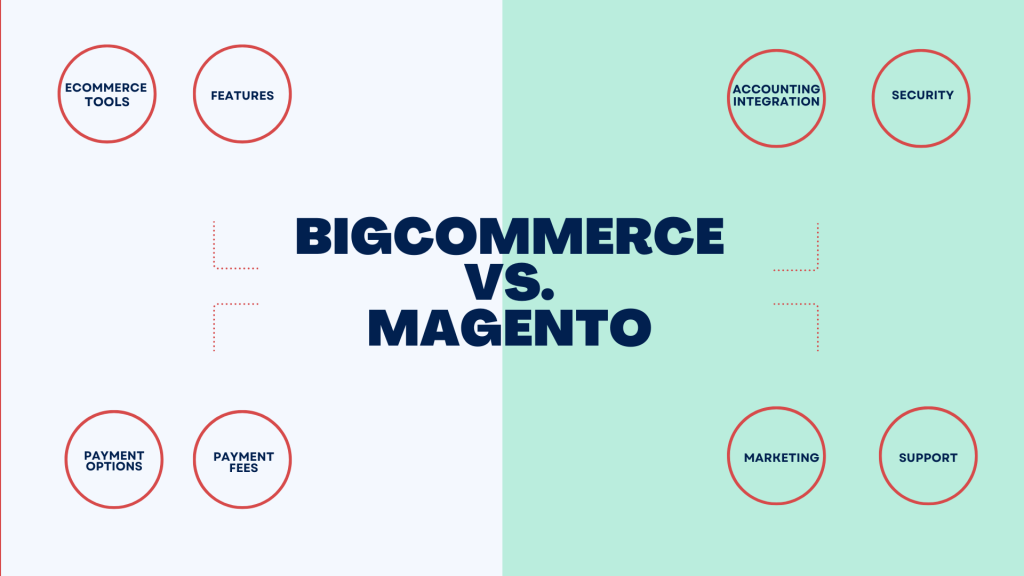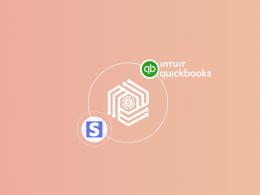I’m sure you know or at least heard of Shopify, as it’s probably the most popular ecommerce platform out there. It provides all the necessary tools to manage your online business, including product showcasing, payment processing, and online promotion. For some reason, however, it might not suit you (like it doesn’t totally address your needs, or you don’t like the vibe, whatever). So, you’ll be seeking an alternative.
BigCommerce and Magento can both make a perfect alternative to Shopify. BigCommerce offers similar scalability, while Magento can provide unmatched customization and control, particularly for larger enterprises.
So, I suggest we compare BigCommerce and Magento today, focusing on their strengths and weaknesses and how they cover the needs of an ecommerce business.
Let’s do it!
Key takeaways
- BigCommerce and Magento present viable alternatives to Shopify, offering scalability, customization, and control, beneficial for smaller businesses and larger enterprises.
- While BigCommerce offers an extensive set of built-in features, ease of use, and simplified pricing plans, Magento stands out for its customization options, scalability, advanced features, and robust community support, catering to diverse business needs and preferences.
- Businesses might want to assess their specific needs and preferences to determine which platform aligns best with their requirements, considering scalability, customization, budget, technical expertise, provided features, and support options and resources.
Let’s look at BigCommerce
BigCommerce is an ecommerce platform that helps businesses create and manage online stores. It first appeared on the market in 2009, offering a solution for companies looking to sell products online. BigCommerce provides various features to make setting up and running an online store easy and efficient.
Its most prominent features include:
- Customizable storefront templates
- Flexible product management tools
- Built-in marketing features like SEO optimization and email marketing, Secure payment processing options,
- And integration with popular third-party apps and services.
In other words, BigCommerce is a pretty comprehensive ecommerce solution suitable for businesses of various sizes looking to establish a strong online presence and grow their sales.
How does BigCommerce work?
BigCommerce operates as a hosted e-commerce solution, so you don’t need to install the software on your server. You register online for a BigCommerce account and access the platform through a web browser.
Once registered, you’ll have access to a dashboard from where you can set up and customize your online store.
Choose from a range of templates and themes to design your storefront, add products, set up payment gateways, and manage orders, all within the BigCommerce platform.
Since BigCommerce is a hosted solution, they handle aspects like server maintenance, security updates, and technical support, allowing you to focus on managing and growing your online business without worrying about the technical details.
A quick look at Magento (Adobe Commerce)
Magento (Adobe Commerce) is an open-source ecommerce platform designed to help businesses create and manage online stores using a variety of native and third-party plugins. It debuted in the market in 2008, offering a powerful solution for businesses from small to large to sell online and manage the process.
Magento is famous for its high level of customization, allowing businesses to tailor their online stores to fit their specific needs and branding.
It comes with extensive product management tools, including options for organizing products, managing inventory, and setting up pricing structures.
Additionally, it provides a range of marketing features such as SEO optimization, promotions, and upselling tools to help businesses attract and retain customers.
All these make Magento a popular choice for businesses looking for a comprehensive ecommerce solution to support their growth.
How do you handle Magento?
Magento is a self-hosted ecommerce platform that requires you to install the software on your server or opt for the cloud-based solution.
To begin with Magento, you can download the software from their website and follow the setup instructions, or alternatively, choose the hosted option offered by Magento Commerce (Adobe Commerce now).
Done with the installation, you gain access to the Magento admin panel, providing a centralized hub for customizing your online store, filling it in with products, configuring payment gateways, and managing orders. With Magento, businesses enjoy complete autonomy over the customization and functionality of their store, allowing for tailored solutions to meet specific business requirements.
However, it’s worth noting that being a self-hosted solution entails responsibilities such as server maintenance, security updates, and technical support, either managed internally or outsourced to a third-party service provider.
A BigCommerce vs Magento comparison
As you can see, both BigCommerce and Magento have so much to offer for ecommerce business running and management. It’s essential, though, to recognize that each platform bears unique strengths and weaknesses. One platform may excel in certain areas where the other falls short.
Being a business owner, you know perfectly well what your business needs, so you might want to be sure the platform you choose fits those requirements and caters to these needs.
At this point, we want to look at various aspects of what an ecommerce business might need to smoothly work and compare both platforms against those aspects. This way, we’re going to go through:
- Ecommerce tools and features,
- Payment options and fees,
- Integration with accounting and other business solutions,
- Security,
- Marketing tools and features,
- Help and support.

1. Ecommerce tools and features
BigCommerce comes with a wide range of built-in features – probably the widest among ecommerce platforms on the market – to help businesses create and manage their online stores efficiently.
Its intuitive dashboard allows users to customize storefronts, manage products, process orders, handle shipping, and track inventory seamlessly. Besides, it offers a secure shopping cart system, abandoned cart recovery, and e-commerce analytics and reporting tools.
If those don’t seem enough, BigCommerce offers 1000+ third-party integrations and applications in their app store to extend your store’s front- and back-end functionality.
Magento offers extensive customization options and scalability, making it suitable for larger enterprises with complex requirements.
Its pre-built functionality might not be as extensive as that of BigCommerce. However, a vast library of extensions and integrations compensates for it, allowing for highly tailored solutions to meet specific business needs. Still, even at the start, you can go with customizable store designs, inventory and order management, shipping, cart management, and analytics.
It’s worth adding that Magento’s learning curve may be steeper compared to BigCommerce, requiring more technical expertise for setup and customization.
2. Payment options and fees
When comparing BigCommerce and Magento in terms of payment options and fees, both platforms offer flexibility but differ in certain aspects.
BigCommerce provides seamless integration with various payment gateways, including PayPal, Stripe, Square, and others, allowing businesses to accept payments online easily. The platform offers transparent pricing plans with clear transaction fees, making it a cost-effective choice for businesses of all sizes.
Magento offers third-party integrations with multiple payment gateways, such as PayPal, Braintree, and Authorize.Net, providing businesses with diverse payment options. However, it comes with extra costs for you. Also, Magento’s pricing structure may involve higher upfront costs, particularly for larger businesses requiring advanced features and scalability, as it typically requires more investment in development and customization.
So, while both platforms offer robust payment solutions, you may need to consider your budget and specific requirements when choosing between BigCommerce and Magento.
3. Integration with accounting and other business solutions
BigCommerce simplifies financial management processes by integrating with popular accounting software like QuickBooks and Xero (directly or through third-party solutions. Besides, it offers an extensive array of built-in integrations and apps, facilitating connectivity with various third-party services and enhancing business operations.
Magento supports integration with multiple accounting and business solutions through its marketplace and extensions. However, being a self-hosted platform, Magento may entail a more intricate setup and maintenance process for integrations compared to the hosted solution provided by BigCommerce.
At this point, you might want to carefully assess integration ease, customization capabilities, and technical demands to decide between BigCommerce and Magento for their accounting and business solution requirements.
Easily connect BigCommerce and Magento (and 25+ other ecommerce and payment platforms) with accounting. Sign up for a 15-day free trial today or spare a spot at our Weekly Public Demo to learn how Synder can help you do it (and many more other amazing Synder capabilities).
4. Security standards
Both platforms approach security seriously, prioritizing the safeguarding of sensitive customer information and preventing cyber threats.
BigCommerce offers built-in security features like SSL encryption, fraud protection, and regular security updates, ensuring a secure shopping experience for customers. It complies with PCI DSS standards, meeting industry requirements for handling credit card data securely.
Magento also prioritizes security measures, including data encryption, two-factor authentication, and security patches to mitigate vulnerabilities. However, with a self-hosted solution, you might want to take additional precautions for server security and maintenance compared to BigCommerce’s hosted platform.
5. Marketing and promotion tools
BigCommerce provides a comprehensive suite of built-in marketing tools designed to empower businesses to attract and engage with customers. You can use customizable email campaigns, abandoned cart recovery mechanisms, as mentioned, and promotional features to incentivize purchases.
A BigCommerce’s advantage is the platform’s built-in integration with social media channels like Facebook and ecommerce marketplaces (Amazon or eBay), dramatically expanding the audience reach and allowing to manage sales on these channels from the BigCommerce dashboard.
It also offers SEO tools to enhance online visibility and drive organic traffic.
Magento offers extensive customization options for marketing campaigns, allowing businesses to create highly targeted promotions and discounts tailored to their specific audience segments.
With its advanced content management system (CMS) and SEO capabilities, Magento enables businesses to craft engaging content and improve search engine rankings.
However, leveraging Magento’s marketing features may require more technical expertise, as setting them up requires implementing native or third-party plugins to your Magento store.
6. Help and support options
In terms of help and support, BigCommerce provides direct assistance via phone, email, and live chat, ensuring prompt responses to user queries. There’s also documentation and tutorials for self-help.
On top of that, BigCommerce hosts a community forum where users can share insights and seek advice from fellow merchants.
Magento approaches customer support differently, encouraging you to use documentation, user forums, and developer communities. It means you might require more technical expertise to handle an issue. You might also seek assistance from Magento-certified developers for personalized support.
Another layer of complexity here can come with Magento as a self-hosted solution. You are responsible for server maintenance, and unless you’re pretty tech-savvy, you may need to outsource technical assistance when required.
At this point, you might want to consider these support options and technical demands when choosing between BigCommerce and Magento, analyzing your capabilities and capacity to handle any issue-related subjects.
How to choose between Magento and BigCommerce?
Now that we know how BigCommerce and Magento approach critical aspects of running an ecommerce business, can we decide which one is the winner? Simply put, it depends on many factors (we’ll talk about them a bit further on.
Meanwhile, let’s look at where one option might beat the other.
Why Magento is better than BigCommerce?
We’ll go with Magento first and see at which points it outsmarts the competitors.
#1 – Magento rules all things customization
Magento offers unparalleled customization options, allowing businesses to tailor their online stores to meet specific needs and branding requirements.
It’s an open-source solution with an extensive library of extensions and integrations, which results in the flexibility to create highly personalized and unique e-commerce experiences. From customizing storefronts to implementing advanced features and functionalities, Magento empowers businesses to create a truly bespoke online presence that sets them apart from competitors.
#2 – It’s a really scalable platform
Magento is highly scalable, making it an ideal solution for businesses with ambitions for growth and expansion. Whether it’s handling increased traffic, adding new products and features, or expanding into new markets, Magento can accommodate the evolving needs of a growing business. Its robust infrastructure and architecture ensure that businesses can scale their online operations seamlessly without compromising performance or user experience.
#3 – It beats the market with advanced features and capabilities
Magento offers a wide range of advanced features and capabilities that cater to the diverse needs of businesses across various industries. From comprehensive product management tools to advanced marketing features and SEO capabilities, Magento provides businesses with the tools they need to succeed in the competitive e-commerce landscape. Additionally, Magento’s multi-store capabilities, support for multiple languages and currencies, and extensive reporting and analytics features further enhance its appeal as a comprehensive e-commerce solution.
#4 – Community support and resources are huge
Magento is a platform with a thriving community of developers, users, and experts who work together to bring about innovation and support each other. Magento users can benefit from a wealth of resources, forums, and documentation that are available to them. This vast network of support and expertise can be very helpful for businesses to seek advice, troubleshoot issues, or share best practices. With Magento’s community support ecosystem, businesses can get access to valuable resources that can help them succeed with their online stores.
#5 – It gives you control and ownership
Magento provides businesses with complete control and ownership of their online stores as a self-hosted platform. You are free to customize and optimize your ecommerce operations according to the unique requirements without being constrained by the limitations of a hosted solution. You control everything – hosting, data, and infrastructure, giving you the autonomy to build and grow your online presence effectively.
Why BigCommerce is better than Magento?
Now, let’s talk about where BigCommerce might shine bright like a diamond.
#1 – In brings you built-in features galore
BigCommerce comes packed with an extensive array of built-in features, reducing the reliance on third-party solutions. From customizable storefronts and robust product management tools to integrated marketing features and seamless payment options – BigCommerce offers a comprehensive suite of functionalities right out of the box.
This means you can get up and running quickly without the need to hunt for and integrate multiple third-party apps. With BigCommerce, everything you need to create, manage, and grow your online store is conveniently built-in, streamlining the e-commerce experience and saving time and resources.
#2 – BigCommerce offers more design choices than Magento
BigCommerce takes the lead when it comes to design flexibility. It offers a wide range of customizable templates and themes. Whether you’re looking for a sleek and modern design or a cozy and rustic feel, BigCommerce has it in the collection. With easy-to-use customization tools, businesses can effortlessly create a unique and visually appealing online store that reflects their brand identity and style preferences.
#3 – It goes with simplified pricing plans
BigCommerce simplifies the pricing process with transparent and straightforward pricing plans, making it easier for businesses to understand and budget their e-commerce expenses.
Unlike Magento, which may involve additional costs for hosting, extensions, and development, BigCommerce offers all-in-one pricing packages that include hosting, security, and support, eliminating the need for businesses to manage multiple vendors and contracts.
#4 – It masters security
BigCommerce prioritizes security by offering built-in SSL encryption, fraud protection, and regular security updates. With BigCommerce, businesses can be confident that their customers’ sensitive information is protected from cyber threats without additional security measures or investments.
#5 – It offers integrations and apps to extend functionality limitlessly
BigCommerce, on top of its built-in features, offers you plenty of integrations and apps to connect with third-party services and implement necessary solutions. From payment gateways to shipping carriers and marketing tools, BigCommerce’s extensive library of integrations makes it easy for businesses to extend the functionality of their online stores and streamline their e-commerce operations.
What factors to consider when choosing the right ecommerce platform for your business?
Now, both platforms come with plenty of tools and solutions, allowing you to establish and run your ecommerce business. Several factors, however, can help you determine which platform to go with. The rule of thumb here, something you start with, is to carefully consider how the selected platform aligns with your unique business needs.
Let’s go look at what else you might want to pay attention to.
Factor #1 – Platform’s scalability
Even starting your business, you might want to think about growing, and this way, consider the scalability of each platform and how well it can accommodate your business growth.
For ecommerce platforms, scalability means they can handle more visitors, sales, and products. If the website can’t handle this growth, it may crash, turning customers away.
A scalable ecommerce platform ensures the website can keep up with the business as it grows, providing a smooth shopping experience for customers while keeping everything running smoothly behind the scenes.
Factor #2 – Customization
You might also want to evaluate the customization options offered by each platform and determine how well they align with your branding and design preferences.
Customization helps businesses to tailor their products and services to meet customer needs, stand out, and optimize their online presence for success. Ecommerce platforms like BigCommerce and Magento allow businesses to create unique online stores that reflect their brand identity.
Factor #3 – Budget
Another factor is the cost implications of each platform, including setup fees, hosting costs, transaction fees, and ongoing maintenance expenses.
BigCommerce features all-in-one pricing packages that include hosting and support, making it easier to budget for ecommerce expenses.
Choosing Magento may involve additional costs for hosting, extensions, and development. So, you need to be sure the overall outcome compensates for these costs.
Factor #4 – Technical expertise
Your technical expertise or access to resources available for managing and maintaining the chosen platform is also a critical consideration.
Some ecommerce platforms don’t require you to be a techy one to manage. But usually, it comes with limitations, restricting you from delivering the level of customer experience of management capacity you might have anticipated. Others, like Magento, being a self-hosted solution, may require more technical knowledge and resources for setup, customization, and maintenance compared to BigCommerce’s hosted solution, which offers more user-friendly options.
Factor #5 – Feature set
Evaluate the features and functionalities offered by each platform and how well they meet your business needs. Magento provides extensive features and capabilities, making it suitable for businesses with complex requirements and specific functionality needs. On the other hand, BigCommerce offers a wide range of built-in features, reducing the reliance on third-party solutions and simplifying the e-commerce experience.
Factor #6 – Support and resources
Consider the level of support and resources available for each platform, including documentation, tutorials, customer support, and community forums. BigCommerce offers comprehensive customer support resources and a community forum, while Magento boasts a large developer community and extensive documentation. But you need to decide whether you prefer to get your questions answered or to look for the answer yourself.
A word about Shopify
I don’t want to go into too much detail about Shopify, but at least we need to look at it real quick.
So, as mentioned, Shopify is one of the most widely used ecommerce platforms. It’s known for its simplicity and versatility, making it ideal for businesses of all sizes.
Shopify possesses an extended feature set, including easy-to-use website-building tools, a secure shopping cart system, and a native payment processing system, Shopify Payments, alongside the possibility of adding more payment gateways.
Shopify also offers customizable themes that are mobile responsive, ensuring you have a professional and user-friendly online store.
If you fancy extending your Shopify capabilities, the platform offers many apps and plugins to connect with various business tools. For instance, Shopify integrates smoothly with popular accounting platforms like QuickBooks and Xero, allowing for better financial management processes.
Still, some businesses may find Shopify less suitable due to its transaction fees, limited customization options for advanced users, and dependency on third-party apps for various functionalities. Businesses with high sales might encounter limitations in terms of scalability with Shopify’s pricing tiers.
Related:
- How to Start a Shopify Store and Run It Successfully: A Shopify Starting Guide
- Best Products to Sell on Shopify: What to Sell on Shopify in 2024 and Succeed
- Accounting for Gift Cards With Synder: Shopify & Square Gift Card Accounting Made Easy
As you can see, nothing can be ideal for everyone, and Shopify is no exception.
And here is where BigCommerce and Magento might come to the scene for you to choose.
Wrapping it up
Long story short, BigCommerce and Magento both can make a viable alternative to Shopify, offering versatile solutions for setting up and running an ecommerce business.
Each platform has unique strengths and weaknesses that cater to different business needs and preferences. BigCommerce shines with its extensive built-in features and simplified pricing plans, making it an attractive option for businesses looking for convenience and scalability. Magento brings to the table unparalleled customization options, scalability, and multiple advanced features, providing businesses with the flexibility and control needed to create tailored solutions.
When choosing between the two platforms, you might want to consider various factors, making sure the chosen platform aligns with your goals and requirements.
You might also want to read about BigCommerce apps.
Share your thoughts
Can BigCommerce or Magento rival with Shopify? What do you think?We’d love to read your opinion in the comments section below!






